LAW6000 Case Study: Partnership, Contract, and Estoppel Analysis
VerifiedAdded on 2023/05/31
|7
|1956
|443
Case Study
AI Summary
This document presents a comprehensive analysis of three business law case studies. The first case examines partnership liabilities, focusing on whether a partnership is bound by a contract formed by a partner exceeding budget limitations, and explores legal remedies. The second case delves into consumer law, addressing false advertising and the rights of customers, as well as the validity of contracts under duress. The third case study analyzes the principle of promissory estoppel, evaluating whether a promise made by one party is legally binding. Each case study identifies the legal issues, relevant legal principles, and applies them to the facts, providing clear conclusions and supporting references to relevant legislation and case law, including the Partnership Act 1892 (NSW), Competition and Consumer Act 2010 (CCA), and key cases such as *Polkinghorne v Holland*, *ACCC v H.J. Heinz Company Australia Limited*, and *Waltons Stores (Interstate) Ltd v Maher*.
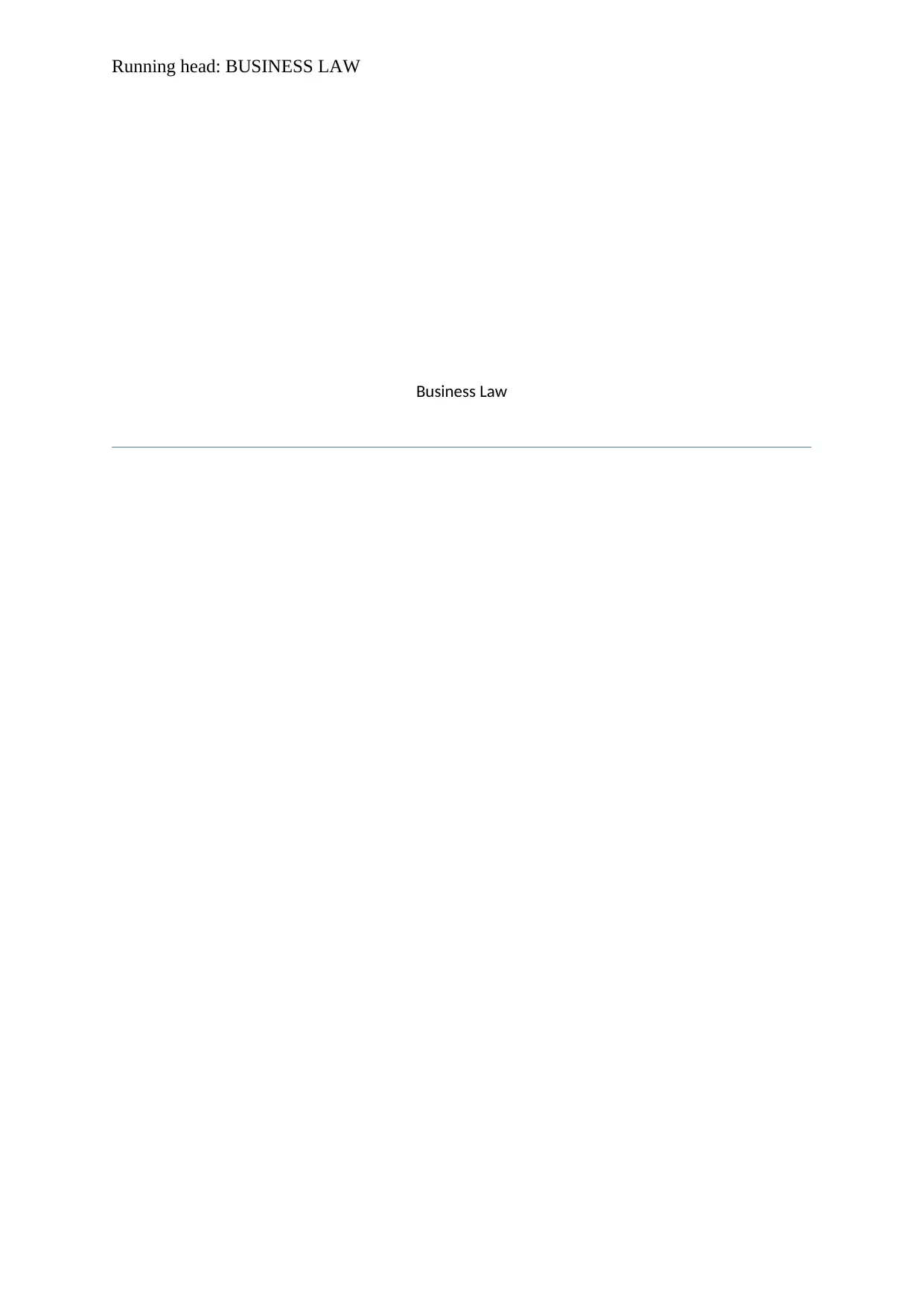
Running head: BUSINESS LAW
Business Law
Business Law
Paraphrase This Document
Need a fresh take? Get an instant paraphrase of this document with our AI Paraphraser
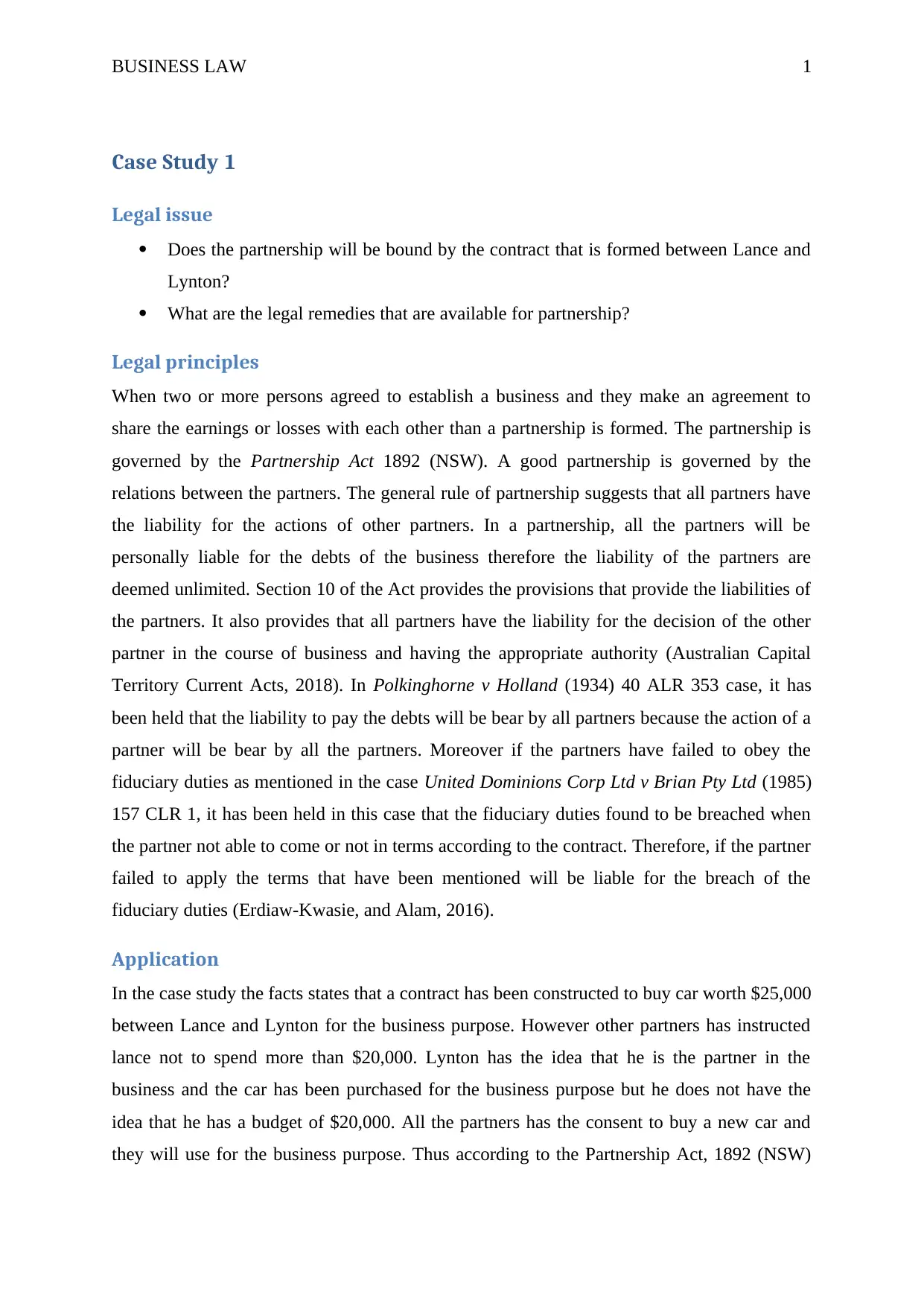
BUSINESS LAW 1
Case Study 1
Legal issue
Does the partnership will be bound by the contract that is formed between Lance and
Lynton?
What are the legal remedies that are available for partnership?
Legal principles
When two or more persons agreed to establish a business and they make an agreement to
share the earnings or losses with each other than a partnership is formed. The partnership is
governed by the Partnership Act 1892 (NSW). A good partnership is governed by the
relations between the partners. The general rule of partnership suggests that all partners have
the liability for the actions of other partners. In a partnership, all the partners will be
personally liable for the debts of the business therefore the liability of the partners are
deemed unlimited. Section 10 of the Act provides the provisions that provide the liabilities of
the partners. It also provides that all partners have the liability for the decision of the other
partner in the course of business and having the appropriate authority (Australian Capital
Territory Current Acts, 2018). In Polkinghorne v Holland (1934) 40 ALR 353 case, it has
been held that the liability to pay the debts will be bear by all partners because the action of a
partner will be bear by all the partners. Moreover if the partners have failed to obey the
fiduciary duties as mentioned in the case United Dominions Corp Ltd v Brian Pty Ltd (1985)
157 CLR 1, it has been held in this case that the fiduciary duties found to be breached when
the partner not able to come or not in terms according to the contract. Therefore, if the partner
failed to apply the terms that have been mentioned will be liable for the breach of the
fiduciary duties (Erdiaw-Kwasie, and Alam, 2016).
Application
In the case study the facts states that a contract has been constructed to buy car worth $25,000
between Lance and Lynton for the business purpose. However other partners has instructed
lance not to spend more than $20,000. Lynton has the idea that he is the partner in the
business and the car has been purchased for the business purpose but he does not have the
idea that he has a budget of $20,000. All the partners has the consent to buy a new car and
they will use for the business purpose. Thus according to the Partnership Act, 1892 (NSW)
Case Study 1
Legal issue
Does the partnership will be bound by the contract that is formed between Lance and
Lynton?
What are the legal remedies that are available for partnership?
Legal principles
When two or more persons agreed to establish a business and they make an agreement to
share the earnings or losses with each other than a partnership is formed. The partnership is
governed by the Partnership Act 1892 (NSW). A good partnership is governed by the
relations between the partners. The general rule of partnership suggests that all partners have
the liability for the actions of other partners. In a partnership, all the partners will be
personally liable for the debts of the business therefore the liability of the partners are
deemed unlimited. Section 10 of the Act provides the provisions that provide the liabilities of
the partners. It also provides that all partners have the liability for the decision of the other
partner in the course of business and having the appropriate authority (Australian Capital
Territory Current Acts, 2018). In Polkinghorne v Holland (1934) 40 ALR 353 case, it has
been held that the liability to pay the debts will be bear by all partners because the action of a
partner will be bear by all the partners. Moreover if the partners have failed to obey the
fiduciary duties as mentioned in the case United Dominions Corp Ltd v Brian Pty Ltd (1985)
157 CLR 1, it has been held in this case that the fiduciary duties found to be breached when
the partner not able to come or not in terms according to the contract. Therefore, if the partner
failed to apply the terms that have been mentioned will be liable for the breach of the
fiduciary duties (Erdiaw-Kwasie, and Alam, 2016).
Application
In the case study the facts states that a contract has been constructed to buy car worth $25,000
between Lance and Lynton for the business purpose. However other partners has instructed
lance not to spend more than $20,000. Lynton has the idea that he is the partner in the
business and the car has been purchased for the business purpose but he does not have the
idea that he has a budget of $20,000. All the partners has the consent to buy a new car and
they will use for the business purpose. Thus according to the Partnership Act, 1892 (NSW)
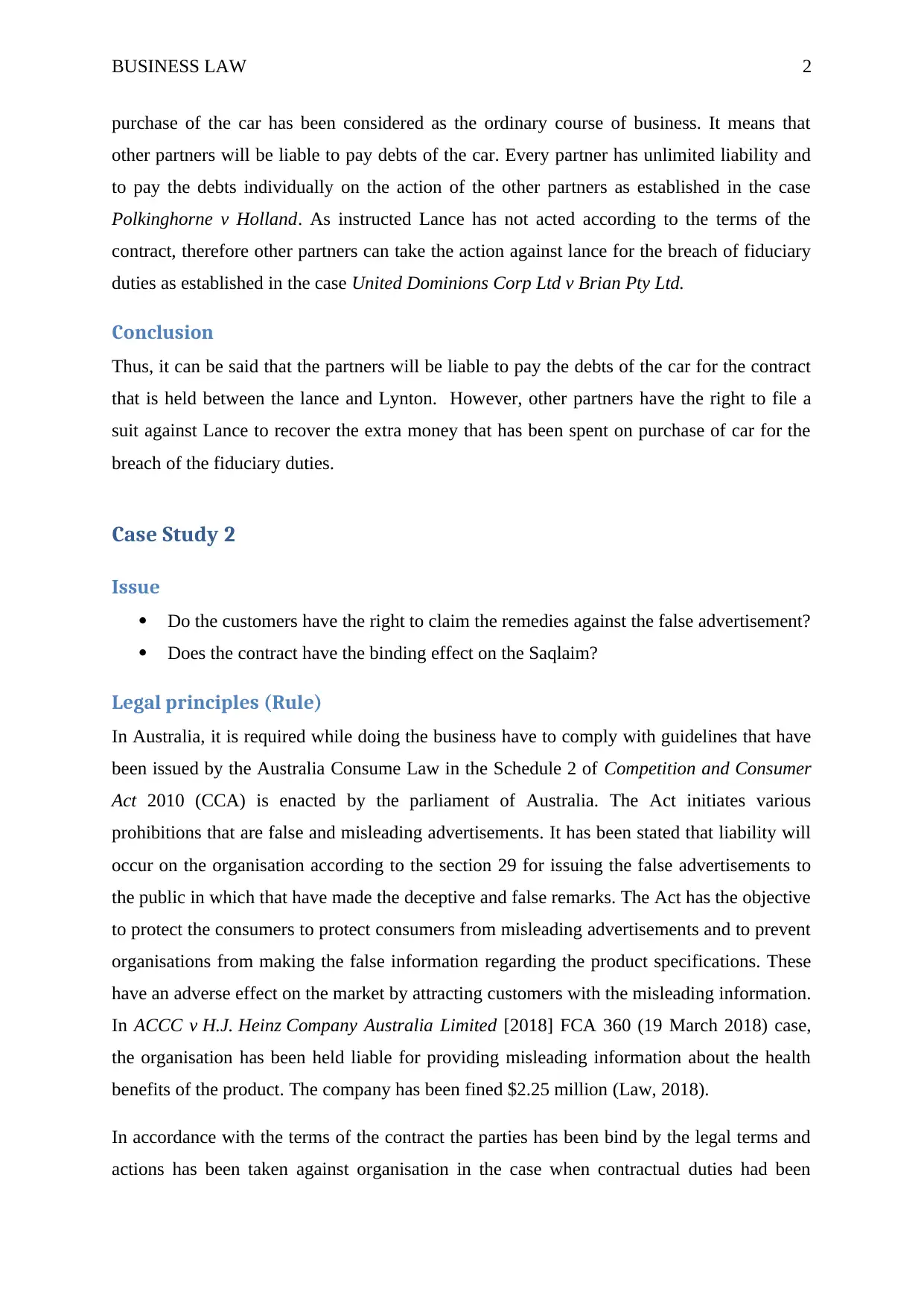
BUSINESS LAW 2
purchase of the car has been considered as the ordinary course of business. It means that
other partners will be liable to pay debts of the car. Every partner has unlimited liability and
to pay the debts individually on the action of the other partners as established in the case
Polkinghorne v Holland. As instructed Lance has not acted according to the terms of the
contract, therefore other partners can take the action against lance for the breach of fiduciary
duties as established in the case United Dominions Corp Ltd v Brian Pty Ltd.
Conclusion
Thus, it can be said that the partners will be liable to pay the debts of the car for the contract
that is held between the lance and Lynton. However, other partners have the right to file a
suit against Lance to recover the extra money that has been spent on purchase of car for the
breach of the fiduciary duties.
Case Study 2
Issue
Do the customers have the right to claim the remedies against the false advertisement?
Does the contract have the binding effect on the Saqlaim?
Legal principles (Rule)
In Australia, it is required while doing the business have to comply with guidelines that have
been issued by the Australia Consume Law in the Schedule 2 of Competition and Consumer
Act 2010 (CCA) is enacted by the parliament of Australia. The Act initiates various
prohibitions that are false and misleading advertisements. It has been stated that liability will
occur on the organisation according to the section 29 for issuing the false advertisements to
the public in which that have made the deceptive and false remarks. The Act has the objective
to protect the consumers to protect consumers from misleading advertisements and to prevent
organisations from making the false information regarding the product specifications. These
have an adverse effect on the market by attracting customers with the misleading information.
In ACCC v H.J. Heinz Company Australia Limited [2018] FCA 360 (19 March 2018) case,
the organisation has been held liable for providing misleading information about the health
benefits of the product. The company has been fined $2.25 million (Law, 2018).
In accordance with the terms of the contract the parties has been bind by the legal terms and
actions has been taken against organisation in the case when contractual duties had been
purchase of the car has been considered as the ordinary course of business. It means that
other partners will be liable to pay debts of the car. Every partner has unlimited liability and
to pay the debts individually on the action of the other partners as established in the case
Polkinghorne v Holland. As instructed Lance has not acted according to the terms of the
contract, therefore other partners can take the action against lance for the breach of fiduciary
duties as established in the case United Dominions Corp Ltd v Brian Pty Ltd.
Conclusion
Thus, it can be said that the partners will be liable to pay the debts of the car for the contract
that is held between the lance and Lynton. However, other partners have the right to file a
suit against Lance to recover the extra money that has been spent on purchase of car for the
breach of the fiduciary duties.
Case Study 2
Issue
Do the customers have the right to claim the remedies against the false advertisement?
Does the contract have the binding effect on the Saqlaim?
Legal principles (Rule)
In Australia, it is required while doing the business have to comply with guidelines that have
been issued by the Australia Consume Law in the Schedule 2 of Competition and Consumer
Act 2010 (CCA) is enacted by the parliament of Australia. The Act initiates various
prohibitions that are false and misleading advertisements. It has been stated that liability will
occur on the organisation according to the section 29 for issuing the false advertisements to
the public in which that have made the deceptive and false remarks. The Act has the objective
to protect the consumers to protect consumers from misleading advertisements and to prevent
organisations from making the false information regarding the product specifications. These
have an adverse effect on the market by attracting customers with the misleading information.
In ACCC v H.J. Heinz Company Australia Limited [2018] FCA 360 (19 March 2018) case,
the organisation has been held liable for providing misleading information about the health
benefits of the product. The company has been fined $2.25 million (Law, 2018).
In accordance with the terms of the contract the parties has been bind by the legal terms and
actions has been taken against organisation in the case when contractual duties had been
⊘ This is a preview!⊘
Do you want full access?
Subscribe today to unlock all pages.

Trusted by 1+ million students worldwide
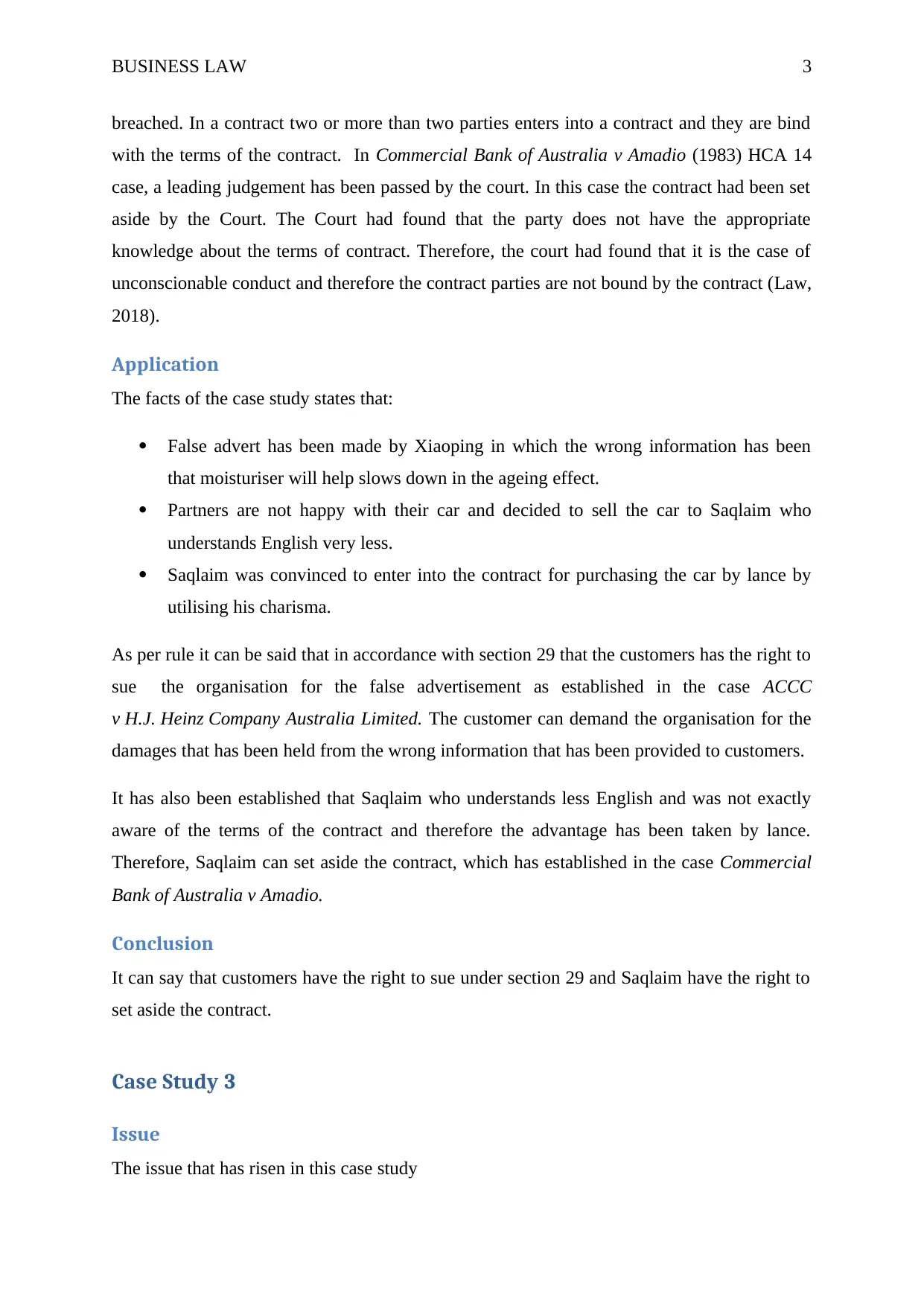
BUSINESS LAW 3
breached. In a contract two or more than two parties enters into a contract and they are bind
with the terms of the contract. In Commercial Bank of Australia v Amadio (1983) HCA 14
case, a leading judgement has been passed by the court. In this case the contract had been set
aside by the Court. The Court had found that the party does not have the appropriate
knowledge about the terms of contract. Therefore, the court had found that it is the case of
unconscionable conduct and therefore the contract parties are not bound by the contract (Law,
2018).
Application
The facts of the case study states that:
False advert has been made by Xiaoping in which the wrong information has been
that moisturiser will help slows down in the ageing effect.
Partners are not happy with their car and decided to sell the car to Saqlaim who
understands English very less.
Saqlaim was convinced to enter into the contract for purchasing the car by lance by
utilising his charisma.
As per rule it can be said that in accordance with section 29 that the customers has the right to
sue the organisation for the false advertisement as established in the case ACCC
v H.J. Heinz Company Australia Limited. The customer can demand the organisation for the
damages that has been held from the wrong information that has been provided to customers.
It has also been established that Saqlaim who understands less English and was not exactly
aware of the terms of the contract and therefore the advantage has been taken by lance.
Therefore, Saqlaim can set aside the contract, which has established in the case Commercial
Bank of Australia v Amadio.
Conclusion
It can say that customers have the right to sue under section 29 and Saqlaim have the right to
set aside the contract.
Case Study 3
Issue
The issue that has risen in this case study
breached. In a contract two or more than two parties enters into a contract and they are bind
with the terms of the contract. In Commercial Bank of Australia v Amadio (1983) HCA 14
case, a leading judgement has been passed by the court. In this case the contract had been set
aside by the Court. The Court had found that the party does not have the appropriate
knowledge about the terms of contract. Therefore, the court had found that it is the case of
unconscionable conduct and therefore the contract parties are not bound by the contract (Law,
2018).
Application
The facts of the case study states that:
False advert has been made by Xiaoping in which the wrong information has been
that moisturiser will help slows down in the ageing effect.
Partners are not happy with their car and decided to sell the car to Saqlaim who
understands English very less.
Saqlaim was convinced to enter into the contract for purchasing the car by lance by
utilising his charisma.
As per rule it can be said that in accordance with section 29 that the customers has the right to
sue the organisation for the false advertisement as established in the case ACCC
v H.J. Heinz Company Australia Limited. The customer can demand the organisation for the
damages that has been held from the wrong information that has been provided to customers.
It has also been established that Saqlaim who understands less English and was not exactly
aware of the terms of the contract and therefore the advantage has been taken by lance.
Therefore, Saqlaim can set aside the contract, which has established in the case Commercial
Bank of Australia v Amadio.
Conclusion
It can say that customers have the right to sue under section 29 and Saqlaim have the right to
set aside the contract.
Case Study 3
Issue
The issue that has risen in this case study
Paraphrase This Document
Need a fresh take? Get an instant paraphrase of this document with our AI Paraphraser
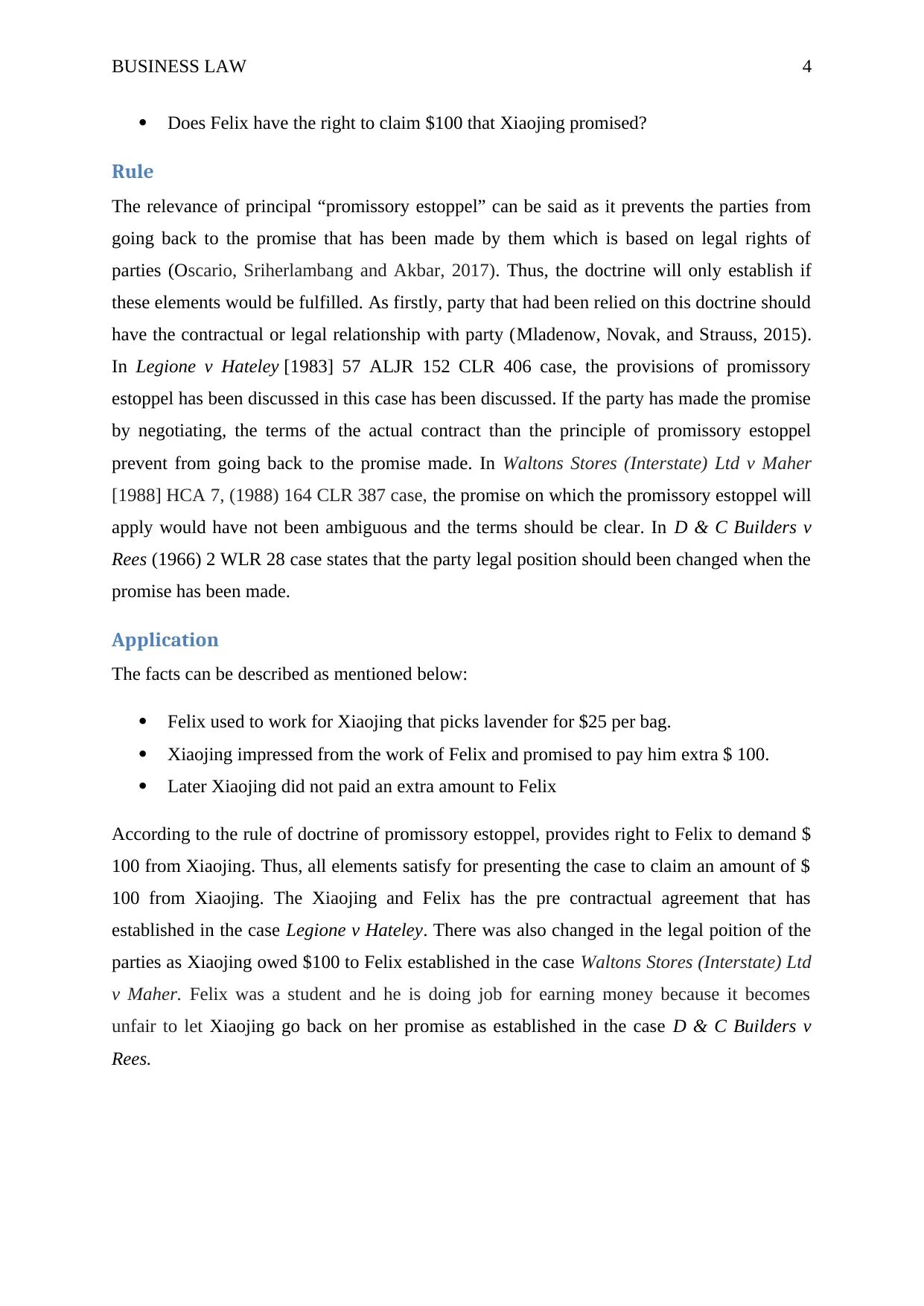
BUSINESS LAW 4
Does Felix have the right to claim $100 that Xiaojing promised?
Rule
The relevance of principal “promissory estoppel” can be said as it prevents the parties from
going back to the promise that has been made by them which is based on legal rights of
parties (Oscario, Sriherlambang and Akbar, 2017). Thus, the doctrine will only establish if
these elements would be fulfilled. As firstly, party that had been relied on this doctrine should
have the contractual or legal relationship with party (Mladenow, Novak, and Strauss, 2015).
In Legione v Hateley [1983] 57 ALJR 152 CLR 406 case, the provisions of promissory
estoppel has been discussed in this case has been discussed. If the party has made the promise
by negotiating, the terms of the actual contract than the principle of promissory estoppel
prevent from going back to the promise made. In Waltons Stores (Interstate) Ltd v Maher
[1988] HCA 7, (1988) 164 CLR 387 case, the promise on which the promissory estoppel will
apply would have not been ambiguous and the terms should be clear. In D & C Builders v
Rees (1966) 2 WLR 28 case states that the party legal position should been changed when the
promise has been made.
Application
The facts can be described as mentioned below:
Felix used to work for Xiaojing that picks lavender for $25 per bag.
Xiaojing impressed from the work of Felix and promised to pay him extra $ 100.
Later Xiaojing did not paid an extra amount to Felix
According to the rule of doctrine of promissory estoppel, provides right to Felix to demand $
100 from Xiaojing. Thus, all elements satisfy for presenting the case to claim an amount of $
100 from Xiaojing. The Xiaojing and Felix has the pre contractual agreement that has
established in the case Legione v Hateley. There was also changed in the legal poition of the
parties as Xiaojing owed $100 to Felix established in the case Waltons Stores (Interstate) Ltd
v Maher. Felix was a student and he is doing job for earning money because it becomes
unfair to let Xiaojing go back on her promise as established in the case D & C Builders v
Rees.
Does Felix have the right to claim $100 that Xiaojing promised?
Rule
The relevance of principal “promissory estoppel” can be said as it prevents the parties from
going back to the promise that has been made by them which is based on legal rights of
parties (Oscario, Sriherlambang and Akbar, 2017). Thus, the doctrine will only establish if
these elements would be fulfilled. As firstly, party that had been relied on this doctrine should
have the contractual or legal relationship with party (Mladenow, Novak, and Strauss, 2015).
In Legione v Hateley [1983] 57 ALJR 152 CLR 406 case, the provisions of promissory
estoppel has been discussed in this case has been discussed. If the party has made the promise
by negotiating, the terms of the actual contract than the principle of promissory estoppel
prevent from going back to the promise made. In Waltons Stores (Interstate) Ltd v Maher
[1988] HCA 7, (1988) 164 CLR 387 case, the promise on which the promissory estoppel will
apply would have not been ambiguous and the terms should be clear. In D & C Builders v
Rees (1966) 2 WLR 28 case states that the party legal position should been changed when the
promise has been made.
Application
The facts can be described as mentioned below:
Felix used to work for Xiaojing that picks lavender for $25 per bag.
Xiaojing impressed from the work of Felix and promised to pay him extra $ 100.
Later Xiaojing did not paid an extra amount to Felix
According to the rule of doctrine of promissory estoppel, provides right to Felix to demand $
100 from Xiaojing. Thus, all elements satisfy for presenting the case to claim an amount of $
100 from Xiaojing. The Xiaojing and Felix has the pre contractual agreement that has
established in the case Legione v Hateley. There was also changed in the legal poition of the
parties as Xiaojing owed $100 to Felix established in the case Waltons Stores (Interstate) Ltd
v Maher. Felix was a student and he is doing job for earning money because it becomes
unfair to let Xiaojing go back on her promise as established in the case D & C Builders v
Rees.

BUSINESS LAW 5
Conclusion
It can be said from the doctrine that Felix has the right to get $100 from Xiaojing a per the
principles of promissory estoppel. All the elements have been satisfied and therefore Xiaojing
owes $100 to Felix.
Conclusion
It can be said from the doctrine that Felix has the right to get $100 from Xiaojing a per the
principles of promissory estoppel. All the elements have been satisfied and therefore Xiaojing
owes $100 to Felix.
⊘ This is a preview!⊘
Do you want full access?
Subscribe today to unlock all pages.

Trusted by 1+ million students worldwide
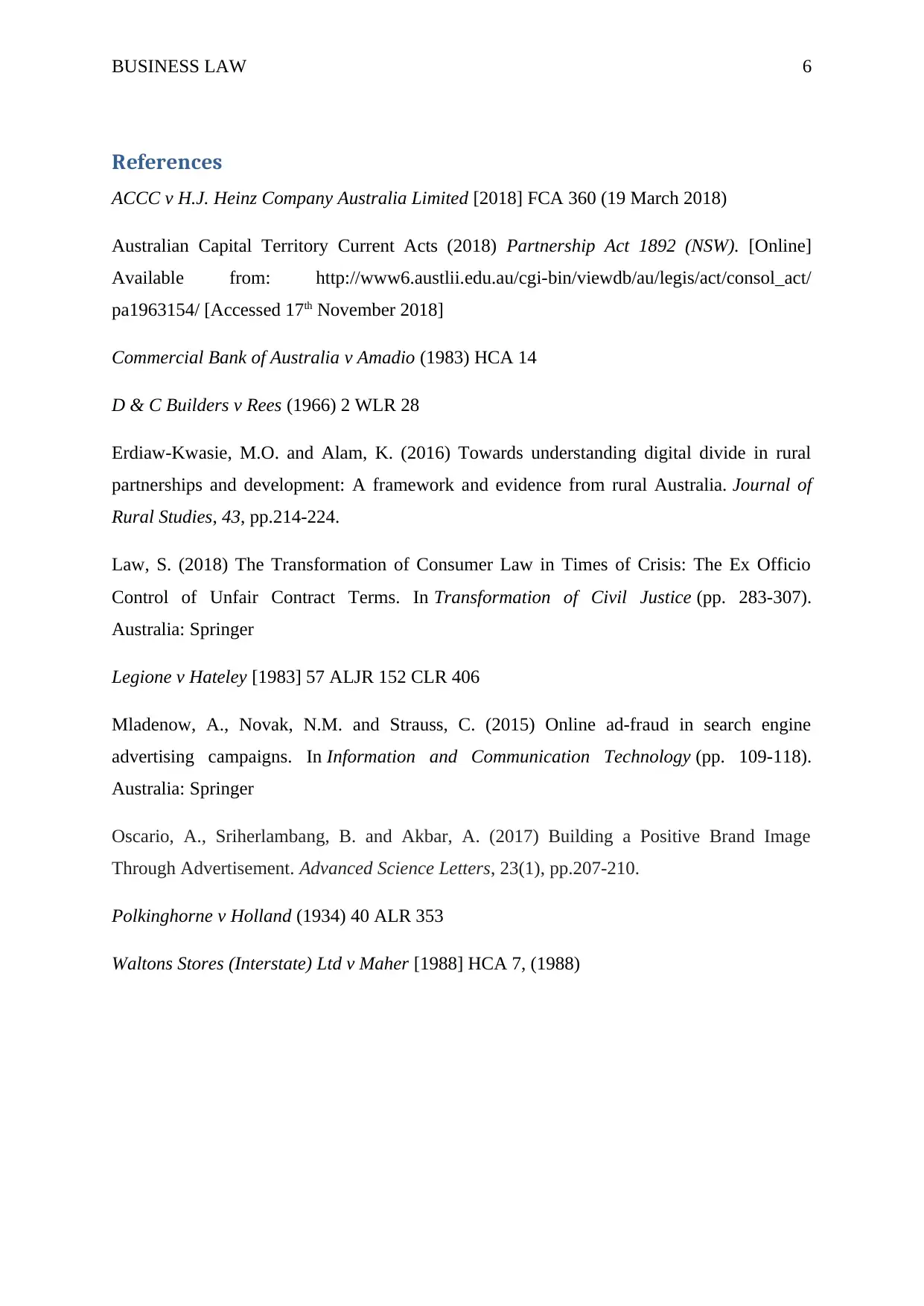
BUSINESS LAW 6
References
ACCC v H.J. Heinz Company Australia Limited [2018] FCA 360 (19 March 2018)
Australian Capital Territory Current Acts (2018) Partnership Act 1892 (NSW). [Online]
Available from: http://www6.austlii.edu.au/cgi-bin/viewdb/au/legis/act/consol_act/
pa1963154/ [Accessed 17th November 2018]
Commercial Bank of Australia v Amadio (1983) HCA 14
D & C Builders v Rees (1966) 2 WLR 28
Erdiaw-Kwasie, M.O. and Alam, K. (2016) Towards understanding digital divide in rural
partnerships and development: A framework and evidence from rural Australia. Journal of
Rural Studies, 43, pp.214-224.
Law, S. (2018) The Transformation of Consumer Law in Times of Crisis: The Ex Officio
Control of Unfair Contract Terms. In Transformation of Civil Justice (pp. 283-307).
Australia: Springer
Legione v Hateley [1983] 57 ALJR 152 CLR 406
Mladenow, A., Novak, N.M. and Strauss, C. (2015) Online ad-fraud in search engine
advertising campaigns. In Information and Communication Technology (pp. 109-118).
Australia: Springer
Oscario, A., Sriherlambang, B. and Akbar, A. (2017) Building a Positive Brand Image
Through Advertisement. Advanced Science Letters, 23(1), pp.207-210.
Polkinghorne v Holland (1934) 40 ALR 353
Waltons Stores (Interstate) Ltd v Maher [1988] HCA 7, (1988)
References
ACCC v H.J. Heinz Company Australia Limited [2018] FCA 360 (19 March 2018)
Australian Capital Territory Current Acts (2018) Partnership Act 1892 (NSW). [Online]
Available from: http://www6.austlii.edu.au/cgi-bin/viewdb/au/legis/act/consol_act/
pa1963154/ [Accessed 17th November 2018]
Commercial Bank of Australia v Amadio (1983) HCA 14
D & C Builders v Rees (1966) 2 WLR 28
Erdiaw-Kwasie, M.O. and Alam, K. (2016) Towards understanding digital divide in rural
partnerships and development: A framework and evidence from rural Australia. Journal of
Rural Studies, 43, pp.214-224.
Law, S. (2018) The Transformation of Consumer Law in Times of Crisis: The Ex Officio
Control of Unfair Contract Terms. In Transformation of Civil Justice (pp. 283-307).
Australia: Springer
Legione v Hateley [1983] 57 ALJR 152 CLR 406
Mladenow, A., Novak, N.M. and Strauss, C. (2015) Online ad-fraud in search engine
advertising campaigns. In Information and Communication Technology (pp. 109-118).
Australia: Springer
Oscario, A., Sriherlambang, B. and Akbar, A. (2017) Building a Positive Brand Image
Through Advertisement. Advanced Science Letters, 23(1), pp.207-210.
Polkinghorne v Holland (1934) 40 ALR 353
Waltons Stores (Interstate) Ltd v Maher [1988] HCA 7, (1988)
1 out of 7
Related Documents
Your All-in-One AI-Powered Toolkit for Academic Success.
+13062052269
info@desklib.com
Available 24*7 on WhatsApp / Email
![[object Object]](/_next/static/media/star-bottom.7253800d.svg)
Unlock your academic potential
Copyright © 2020–2025 A2Z Services. All Rights Reserved. Developed and managed by ZUCOL.



